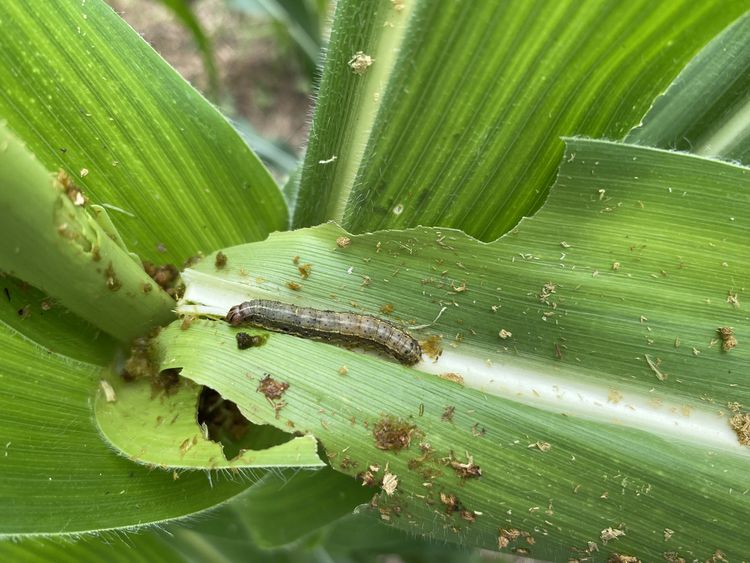Contents

Brown patches on your lawn can be attributed to several factors, such as drought conditions, dog urine, diseases, or damage from excessive sunlight or fertilizers. While less frequently encountered, armyworm caterpillars can also be responsible. These pests, which thrive in cool-season grasses, can lead to significant lawn damage if not managed properly.
We consulted an entomologist to discover effective methods for eliminating armyworms, ensuring your lawn remains vibrant and healthy.
Introducing the Specialist
Dr. Tracy Ellis is a distinguished entomologist recognized for her achievements, currently working with FarmSense, a consultancy that assists farmers with pest management.
What are armyworms?
Armyworms are the caterpillar stage of certain moth species that pose a threat to grasses and agricultural crops. In North America, the true armyworm (Mythimna unipuncta) and the fall armyworm (Spodoptera frugiperda) are two prevalent varieties.
- Genuine armyworms feature a prominent dark mark located at the base of their abdominal prolegs, along with an orange stripe running along each side of their body.
- Fall armyworms are characterized by a unique white “Y” shape on their heads.
According to Dr. Tracy Ellis, a clear indication of a fall armyworm infestation is the presence of visibly damaged areas on a well-maintained lawn during the late summer and autumn months.
According to Dr. Ellis, armyworms have a strong preference for various types of grasses, such as the well-known Bermuda grass, Kentucky bluegrass, switchgrass, buffalo grass, and zoysia grass. In addition to grasses, they also consume certain garden vegetables, ornamental plants, and weeds.
Looking for additional gardening advice? Subscribe to our complimentary gardening newsletter to receive our top cultivation tips, problem-solving strategies, and much more!
Tip
Consistently monitor your lawn and any other vegetation susceptible to armyworm harm. Identifying issues early and taking swift measures can reduce damage and simplify the process of eliminating infestations. Additionally, installing moth traps can aid in preventing the laying of armyworm larvae.
Four Ways to Eliminate Armyworms
Prior to taking any steps to eliminate armyworms, Dr. Ellis emphasizes the importance of verifying that these pests are indeed the issue in your garden.
Dr. Ellis recommends conducting a soap drench test to reveal concealed insects and identify whether the fall armyworm is responsible. She advises combining 1 ounce of a high-quality liquid dish soap with a gallon of water.
Apply a few gallons to saturate a single square yard of grass,” she advises. “Capture images of the insects discovered during the soap drench test to share with your local extension office or pest control service.
In addition to searching for unique characteristics on the caterpillars, Dr. Ellis mentions that you may spot the fall armyworm’s mother—a grayish-brown moth with a wingspan of 1.5 inches—gliding over lawns and host plants on humid summer evenings.
Here are four methods to eliminate armyworms.
Clear Your Landscape of Weeds
Maintain a weed-free environment in your lawn, flower beds, and vegetable garden.
“Weeds can serve as possible shelters for the eggs and young larvae of armyworms,” states Dr. Ellis.
Additionally, she notes that various weeds can be part of the diet of armyworms, such as pigweed, dandelion, buttonweed, sow thistle, nightshade, crabgrass, and others. Cultivating the land can also aid in managing weeds and eliminating armyworm pupae that hibernate in the soil.
Utilize Organic Control Products with Lower Risk.
Organic insecticides designed to manage armyworms pose a lower risk to the environment and the beneficial organisms in your garden compared to conventional broad-spectrum chemical solutions.
- Products that include the active component Bacillus thuringiensis (Bt) contain a bacterium that research indicates is effective when ingested by young armyworms measuring less than half an inch in length.
- Steinernema carpocapsae, a type of entomopathogenic nematode, are tiny worms capable of eliminating armyworm larvae and pupae, all while being safe for humans and pets.
Applying beneficial nematodes is straightforward with a watering can or sprayer, following the recommended rates provided by the manufacturers.
Promote Helpful Predatory Insects
By steering clear of wide-ranging insecticides and cultivating a variety of plant species, you can promote the presence of natural predators of armyworms, thereby helping to keep their populations in check.
Beneficial insects that either lay their eggs on or consume armyworms include stink bugs, big-eyed bugs, ground beetles, rove beetles, tachinid flies, certain species of assassin bugs (such as Rhynocoris segmentarius), and parasitic wasps.
Utilize Chemical Control Agents
Resort to more aggressive chemical measures against armyworms only when absolutely necessary, such as when infestations spiral beyond manageable levels and other cultural and biological strategies have failed. Even in such cases, it may prove difficult due to the emergence of insecticide resistance within armyworm groups.
The products deemed safe for armyworm treatment can differ from one state to another, with certain items classified as restricted-use, requiring application by a licensed professional. Dr. Ellis recommends utilizing only the strategies suggested by your local extension office or a pest management expert.
Insecticides with active components such as bifenthrin, cypermethrin, carbaryl, cyfluthrin, deltamethrin, and permethrin can be effective in managing armyworm populations.
Do armyworms come out at night?
Armyworms are not strictly nocturnal; however, they exhibit increased activity during nighttime and on cloudy days. According to Dr. Ellis, they seek refuge in the thatch of the lawn to escape the daytime heat and emerge when the temperatures drop.
Is vinegar effective in eliminating armyworms?
Vinegar is not a viable solution for eliminating armyworms. Dr. Ellis points out that applying vinegar is more likely to harm the plants than to eradicate the armyworms. She advises using techniques that are endorsed by local extension services or pest control experts.


 Do Citronella Plants Truly Deter Mosquitoes?
Do Citronella Plants Truly Deter Mosquitoes? Are Ants Invading Your Vehicle? Here’s How to Eliminate Them Quickly
Are Ants Invading Your Vehicle? Here’s How to Eliminate Them Quickly